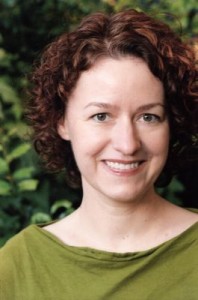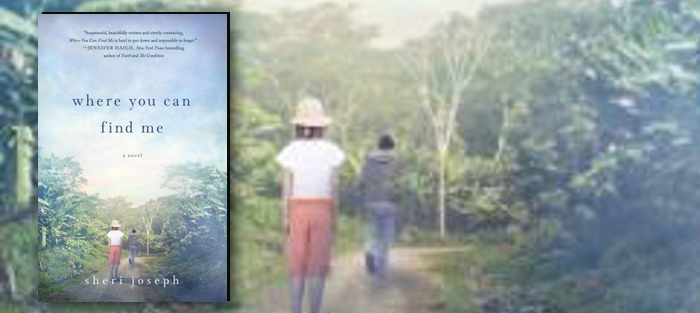I was a kid in the early ‘80s, and I remember the missing children campaigns well. The faces of kids on milk cartons staring at me while I ate a bowl of Frosted Flakes. The hyper-vigilance about child molesters that made its way into the storylines of Different Strokes and Family Ties. The gossip about any man driving a white van. All the made-for-TV movies. I believed there were endless possibilities of unspeakable horrors awaiting me if I talked to strangers.
Though they stopped printing the faces of missing kids on milk cartons years ago, reports of human trafficking and child sex slaves and sociopaths cruising online circulate in the news and flood the storylines of crime shows. We don’t get tired of hearing these stories. Our collective fascination, disgust and repulsion–wiith a tinge of voyeurism–ensures there will always be another episode of Law & Order SVU more freakish than the last. It’s a sensational subject for literary fiction, to say the least: sentimentality, predictable plots, and gratuitous graphic details are just a few of the pitfalls a writer might stumble into when dealing with such a risky subject.
But Sheri Joseph never makes any of these mistakes. In Where You Can Find Me (Thomas Dunne Books), Joseph’s third book, Joseph writes about the disappearance of a child with grace and complexity. This isn’t about the FBI’s search for the missing boy or about the prosecution of his abusers. Instead, Joseph explores the messy, complicated aftermath of the child’s return, asking important questions that don’t get asked on TV: What happens when he comes back home? How does he reintegrate into the family? How does a family welcome back a child they no longer know?
 Caleb Vincent is eleven when he disappears. Three years later, he’s found living with a man he calls Jolly outside of Seattle. The novel begins shortly after Caleb is reunited with his family in the suburbs of Atlanta. Joseph starts with a shot of the exterior of the Vincents’ house, the way it looks to TV viewers and the crowds, and to us, the readers. It’s a house of secrets, with closed curtains and blinds, “so that the house resembled a closed eye.”
Caleb Vincent is eleven when he disappears. Three years later, he’s found living with a man he calls Jolly outside of Seattle. The novel begins shortly after Caleb is reunited with his family in the suburbs of Atlanta. Joseph starts with a shot of the exterior of the Vincents’ house, the way it looks to TV viewers and the crowds, and to us, the readers. It’s a house of secrets, with closed curtains and blinds, “so that the house resembled a closed eye.”
Inside, the family moves around each other with uncertainty. Marlene and Jeff are trying to figure out how to be around their son, “this strange tall boy of fourteen,” while Caleb, who for the past three years has gone by the name Nicky, wonders who they expect him to be: “He lay on his back in Caleb’s bed, impersonating Caleb, eyes closed, then open because the door was shut, so they couldn’t peek in to check if he was still there, if he looked like Caleb yet.”
It’s true, he’s hardly recognizable to his parents. He’s a polite, quiet teenager who plays piano beautifully and knows more than a fourteen-year-old should. At first, the only person he trusts is his younger sister, the precocious Lark, who understands very little about Caleb’s disappearance except that he was her age, eleven, when he “entered the Gone.” Now that he’s back, he is “a stranger, half a grown-up, a fascinating relation. It was as if some creature more endangered and exotic than the cloud forest itself had been brought into their house and placed partly in her care.”
Joseph’s use of an omniscient narrator, who enters the minds of Lark, Marlene, Caleb, and to a lesser degree, Jeff, gives her the freedom to explore the individuality of each character while emphasizing their common link: when Caleb went missing, their lives changed irrevocably, and now that he’s home, they can’t just stitch everything neatly back together. Marlene is still angry with Jeff, who had accepted that his son was probably dead and now can’t wrap his head around Caleb’s return: “that he was alive was an accident, a pure improbability.” While Jeff has faith in the healing power of space and silence, Marlene, “a believer in the inherent value of communication,” won’t let Caleb out of her sight.
Joseph is a compassionate and unsentimental writer, and the characters in these pages are complicated, ordinary, and flawed. At first glance, Marlene is an artsy, liberal woman who left the city, somewhat begrudgingly, to raise her kids in the suburbs. She also has a meth and coke habit, and the night Caleb disappeared, she was out buying herself a few bumps. Marlene wants desperately for Caleb to feel close to her. She’s open with him in a way that makes Jeff uncomfortable, but for Marlene, this is a way to connect, as it is when she talks with Caleb about her own (and his) drug experiences:
Any mention of her drug use calmed him visibly, like a reminder that they could be friends, transgressors together, on this thin ledge of commonality. It made her weirdly grateful to have been such a terrible mother.
Jeff wants to restore the family unit piece by piece, but Marlene believes the only way to heal is to take “drastic measures.” So, while Jeff stays behind, Marlene and the kids board a plane to Costa Rica, where Jeff’s mother Hilda resides. Marlene, Caleb, and Lark move in with Hilda and Uncle Lowell, Jeff’s brother, in the rundown, majestic hotel that Hilda has vague plans to renovate. For now, it sits precariously on the side of the mountain, and parts of the house are uninhabitable: “The pieces that had cracked through the canopy had landed and been swallowed back into jungle humus, grown over with moss and vine.” They’re living on land that’s part of the cloud forest, an Edenic paradise that conservationists, including Hilda, are trying to save, and that Lark has been obsessed with ever since her brother disappeared. This setting is part of the novel’s motif, the desire to save and protect what has been damaged. Nearby, a wildlife center provides sanctuary for hurt and endangered animals. When Marlene gets involved, acting as a mother to a flock of motherless birds, she sees the obvious symbolism, and wonders about her son, “What was left in him to protect?”
Caleb, at first, is like the Vincent house, sealed with secrets, impenetrable to his parents and readers, even to himself. All his anger, pain, and shame are buried deep, like his memories about the Gone. Advised by therapists and the FBI, the family doesn’t ask questions, but he knows they want to: “He was ashamed of what they all knew even knowing so little, the parts too horrible to speak.” With the media, it’s even worse: they want to know his story, not him, and Caleb is well aware of society’s collective fascination:
Caleb Vincent was the one they wanted to untangle and lay bare. No one said Hey, let’s rape the kid all over again on national TV, but that was the footage they wished for, the part of what happened they most hoped to reproduce.
Is Joseph calling us out too, implicating us in our desire to know what happened? Joseph lets the story of Caleb’s kidnapping and captivity surface slowly, dropping a trail of shocking, disturbing details that still never fully explain everything—because how can such a horror be explained? We learn about the pedophile ring. We hear about the “parties,” the possible deaths of the other children. For Caleb, much of the Gone is a blur of hallucinations and nightmares, the damage so intense that, for self-protection, he sometimes convinces himself nothing happened: “Maybe that was some other boy in those photos. He didn’t fully believe it was him, so how could they know?” When Marlene asks for just one detail about where he was held, he is sparse with description: “‘It was cold,’ he said, and shivered, and there it was, that anger he didn’t think he had.” It’s what Caleb doesn’t tell her, what he leaves out in order to protect her like she wants to protect him, that is so devastating.
After Caleb was kidnapped, he “lived a dog’s existence” with a monster named Chet until he met Jolly at one of the parties. Jolly was a “doctor,” providing the children at the parties with medical attention. According to the FBI, he’s a pedophile who manipulated and brainwashed Caleb, but in Caleb’s eyes, Jolly saved him. He knows Jolly as a kind and intelligent man who cooked Caleb gourmet meals, educated him, and built up his self-esteem. Joseph doesn’t offer easy-to-digest descriptions of the dynamic between Caleb and Jolly. Instead, she examines the complexity of the abuse, the power and manipulation and perversion, and the love—because in some twisted way, maybe Jolly did love him, or at least Caleb thinks so. And for Caleb, Jolly became the only world he trusted:
I just wanted to be near him. It was like a religion, or the way you love your parents when you’re really little. I believed in him.
While the move to Costa Rica gives the Vincents a sanctuary, as it does the endangered animals, and is less dangerous than their own home with its many reminders of the Gone, the Vincents are also more vulnerable here, less bound by old structures: “Their world was a cloud, made not of fluffy cotton but of water.” The cloud forest is not an easy place to navigate, but it offers the strange and wonderful:
Broad, veined piper leaves like the ones Lark had taught herself to draw on fund-raiser posters gleamed in their sheen of water. Vines hung in loops between the trees. Ferns radiated above; palm fronds flapped wetly; moss clung to every surface.
The cloud forest, with its watery setting where there are no distinct borders, cultivates a kind of magic. Fittingly, it’s here that Caleb and Lark meet the neighbors, Isabel Rosales and her cousin Luis, a brujo, or witch, who tries to help Caleb get rid of the ghosts—the children from the Gone—who still haunt him.
Luis is “the prettiest” of the Rosales women, wearing dresses and makeup. He hides from his father, who beats him for not looking like a man. Luis tries out different female names and switches between male and female pronouns, although Caleb usually refers to him with male pronouns. Caleb is not at all shocked by Luis’s transgender identity: “He’d come across boys who had some girl in them before, and he knew there were boys who were all girl; this one struck him as maybe half.” Joseph’s intelligent depiction of the fluidity of gender is refreshing, an enlightening view that subtly questions society’s perpetuation of the gender binary. And, she doesn’t limit her descriptions of androgyny just to Luis—occasional descriptions of other characters also blur the lines between male and female. For example, Marlene is “petite with a distinct jawbone and ropey little muscles—she needed her long, twisty hair, she used to say, so she didn’t look like a teenaged boy.”
Caleb finds an affinity with Luis, a connection to someone who lives on the margin, who has secrets: “But his thoughts of Luis generally called for no language, no pronouns at all to push him out of that drifty middle where he seemed to belong.” Gender, then, is like the cloud forest, shifting and without borders.
 Questions of sexuality come up for most kids, but for Caleb, the question is more intense and urgent. How does a kid who has lived through such a hell return to the “normal” world? He isn’t sure if he’s gay or straight, but Marlene isn’t alarmed by this, and neither is Uncle Lowell. Rather, they want him to take his time figuring himself out. Joseph writes about Caleb’s confusion with compassion, while also exploring how the trauma of abuse complicates his understanding of sex, desire, and love.
Questions of sexuality come up for most kids, but for Caleb, the question is more intense and urgent. How does a kid who has lived through such a hell return to the “normal” world? He isn’t sure if he’s gay or straight, but Marlene isn’t alarmed by this, and neither is Uncle Lowell. Rather, they want him to take his time figuring himself out. Joseph writes about Caleb’s confusion with compassion, while also exploring how the trauma of abuse complicates his understanding of sex, desire, and love.
Caleb carries the scars of the trauma with him, and even in the quietest of scenes, the tension is taut whenever he appears—maybe he’ll act inappropriately with other children, or remember another terrible detail, or he’ll finally break—and the last third of the novel is a gripping page-turner.
Yet this is the story of a family, and as Caleb grows stronger and more comfortable in his own skin, so does Marlene, and she figures out that to know her son and to heal her family means “moving closer to the strange, the uncertain, accepting it into her life, enlarging the context.” Where You Can Find Me doesn’t explain the unexplainable, but instead opens us to a complicated world of pain and love and mystery, a world that we both know and can never know.






